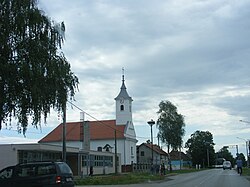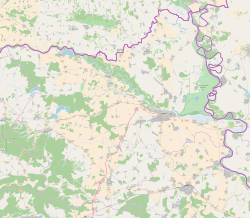Sarvaš
Sarvaš | |
|---|---|
 Sarvaš | |
| Coordinates: 45°32′N 18°50′E / 45.533°N 18.833°E | |
| Country | |
| County | |
| Area | |
| • Total | 19.4 km2 (7.5 sq mi) |
| Population (2021)[2] | |
| • Total | 1,658 |
| • Density | 85/km2 (220/sq mi) |
| Time zone | UTC+1 (CET) |
| • Summer (DST) | UTC+2 (CEST) |
Sarvaš (German: Sarwasch-Hirschfeld, Hungarian: Drávaszarvas) is a village in eastern Slavonia, Croatia, east of Osijek. It has a population of 1,658 (census 2021). It is administratively within the area of the city of Osijek. Szarvas means "deer" in Hungarian.
History
[edit]One Scordisci archaeological site in Sarvaš dating back to late La Tène culture was excavated in the 1970s and 1980s as a part of rescue excavations in eastern Croatia.[3] Archaeological site was a part of the settlement network of Scordisci in the area of Vinkovci.[3]
According to the 1931 census in the Kingdom of Yugoslavia, the town's population included 1157 Danube Swabian Germans (the majority).[4] These folk were almost all expelled by the Communist regime of Josip Broz Tito after 1945.[5]
The local Catholic church was completely destroyed in the country's War of Independence.[5] By 2006 the church was restored.[6]
References
[edit]- ^ Register of spatial units of the State Geodetic Administration of the Republic of Croatia. Wikidata Q119585703.
- ^ "Population by Age and Sex, by Settlements" (xlsx). Census of Population, Households and Dwellings in 2021. Zagreb: Croatian Bureau of Statistics. 2022.
- ^ a b Dizdar, Marko (2016). "Late La Tène Settlements in the Vinkovci Region (Eastern Slavonia, Croatia): Centres of Trade and Exchange" (PDF). Boii - Taurisci: Proceedings of the International Seminar, Oberleis-Klement, June 14th-15th, 2012. Austrian Academy of Sciences Press: 31–48. Retrieved 22 January 2019.
- ^ Slavonia census of 1931 Archived 2008-06-04 at the Wayback Machine
- ^ a b Sakralna baština Podunavskih Švaba u Hrvatskoj
- ^ Day of Sarvaš celebrated Archived 2007-10-28 at the Wayback Machine




